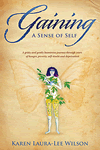
Gaining a Sense of Self
Many years later when I asked how she felt when the doll was accidentally smashed she replied “I could have killed you”. She meant it. Six decades on she still had not forgiven me. Read more about “Gaining a Sense of Self”

Book Publishers
At 7 years of age Karen was taken by her mother to Nazareth House in Wynnum, Queensland and stayed there for 8 months while Lee went on holiday to recover from a broken marriage. It wasn’t many hours into her stay before Karen was slapped across the face by a nun because she had begun eating dinner without first saying grace. This rapid initiation into Catholic ritual was followed by learning the rules of the orphanage which included not being able to look at her naked body and only going to the toilet in accordance with a rigid schedule. You might not think the latter was a big deal, but on one occasion, having been given a dose of castor oil by a particularly cruel nun, Karen was not allowed to go to the toilet after lights out because that was against the rules. She ended up soiling her pyjamas and, to add to the small child’s humiliation, then slept in those smelly pyjamas for a week in order to avoid further punishment.
By the time she left the orphanage Karen was quiet, withdrawn, under-nourished and sporting a shaved, bleeding head. Her mother began to cry when she saw what had happened to her young daughter. I was surprised that her mother was affected in this way as there was little indication prior to the orphanage episode that Lee cared about her daughter at all. Sadly, the book is filled with horror stories from Karen’s childhood of abuse, neglect and cruelty at the hands of her mother.
Wilson’s book affected me on three levels. First, there was the engaging story of a child coping with a difficult life and growing into a young woman who managed to get herself university educated. Because of the intimate details in the book – biting into a threepenny bit when eating Christmas pudding, despair and grief felt at the loss of her dog, first period, first sexual encounter – I felt I’d gotten to know Karen quite a lot and was watching her grow up with each chapter. I couldn’t help but admire her resilience, courage, resourcefulness and persistence and I was delighted at the end of the book to find out that on reflection Wilson had been able to re-evaluate her first twenty-five years of life and was no longer regarding herself as a failure. In my eyes she was always a plucky child who grew into a courageous and determined young woman.
On another level I enjoyed the social history aspects of Wilson’s story as well as importantly they reveal what impact various social norms and government policies have on our lives too. A poignant example is that of the social taboo around talking about menstruation which meant a young girl suffered miserably each month for several years trying to cope with using, washing and drying ‘rags’. Another example is that of Commonwealth Scholarships without which it is highly unlikely Karen would have been able to go to university, straight from school at least. However, she still needed to work in order to support herself and she was under immense pressure to maintain her grades because failure meant losing that scholarship. With the current interest in boosting the numbers of tertiary educated citizens from low SES backgrounds, Wilson’s story is a timely signpost to some of the difficulties faced by students from ‘non-traditional’ (meaning not middle class) students.
Finally, I found I could relate personally to many aspects of Karen’s story. I too had a (foster) mother who could be cruel, uncaring and punitive and who was nicest to me when other people were around. I too remember being sent on shopping errands and eating the soft doughy insides of freshly baked bread on the way home. I too had my best friends – favourite books I’d read and reread many times – packed up and sent away without being asked if I’d finished with them.
If you want to be inspired read Karen Wilson’s book and rejoice in her emergence as a delightful young woman."